#the CULMINATION of work by living in an apocalypse and now longer being able to live in that black and white world her master made for her
Explore tagged Tumblr posts
Note
*Sees Himiko edit* *Remember that Tenko is canoncially transphobic* Oh no...
Tenko is going on a LOVELY training arc with some VERY nice older trans ladies who saw her and went "free daughter" because we here in the house of the playlist maker believe in PATIENCE and KINDNESS for the naively ignorant so now she's got like three moms and they're all giving her a crash course on gender and she doesn't fully get it yet but shes working on it!
#in MY HOUSE tenko gets CHARACTER GROWTH#i WILL scream about how i fixed tenko's gender shit for my main extended worldbuilding from the rooftops#and while himikos transition does play a key role for this as tenko grapples with her genuine care and love for himiko that never fades#even as himiko gets more and more visibly masculine and male#it is only a PART of tenko's arduous journey to unlearning all that bullshit#the CULMINATION of work by living in an apocalypse and now longer being able to live in that black and white world her master made for her#ndrv3#my dr lore#anon chaos
13 notes
·
View notes
Text
I made this post a few days ago and was asked for more input on Sting's character in regards to future Rogue so here's some more thoughts:
Enjoy <3
Future Rogue explicitly says he killed Sting and took his power but I have my doubts about that:

f!Rogue said to Natsu that in one year from the games Frosch would be killed by Gray and thus his pillar would be gone and he would succumb to his shadow, meaning during Avatar Gray and Rogue would fight for whatever reasons.

But Tartaros happened before Avatar, and during this arc we witness Sting and Rogue's first shown improvement after vowing to change Sabertooth, which culminates in both of them killing Jienma and erasing Sabertooth's ugly past for good. (also using a unique unison raid that only they can do <3)
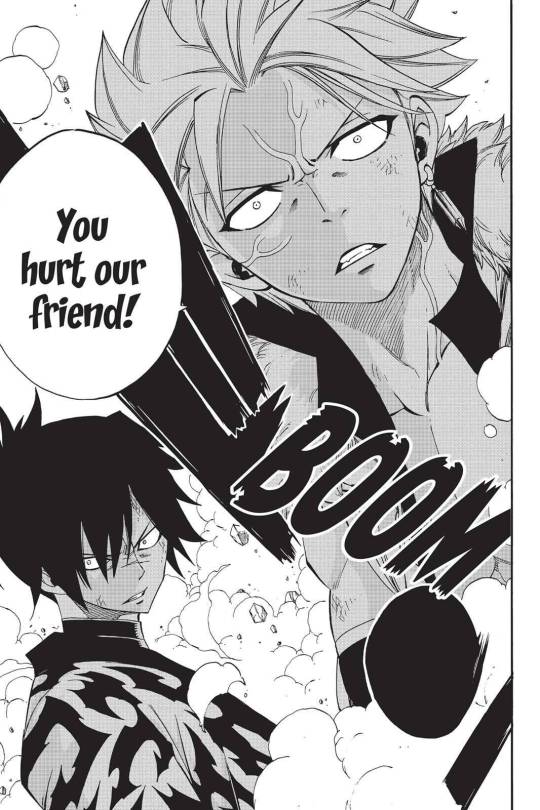
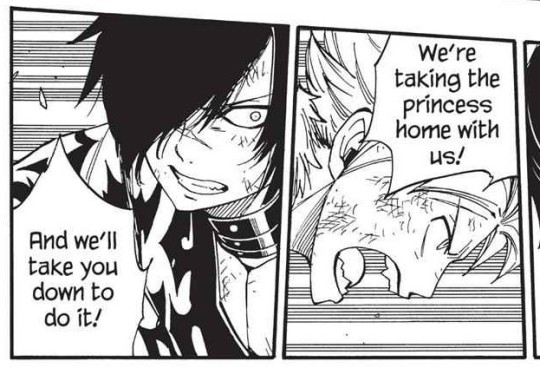

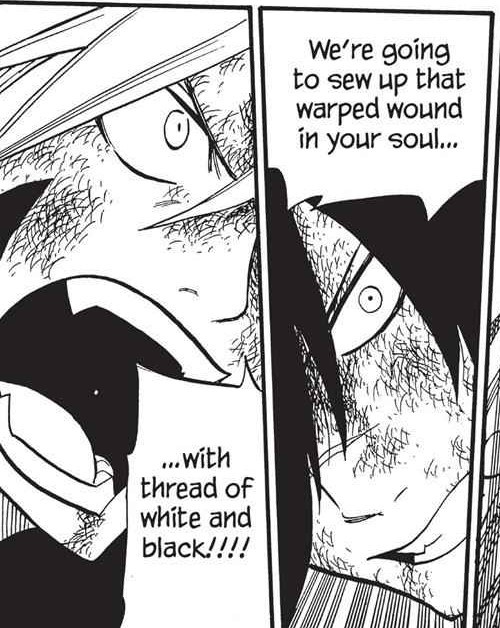
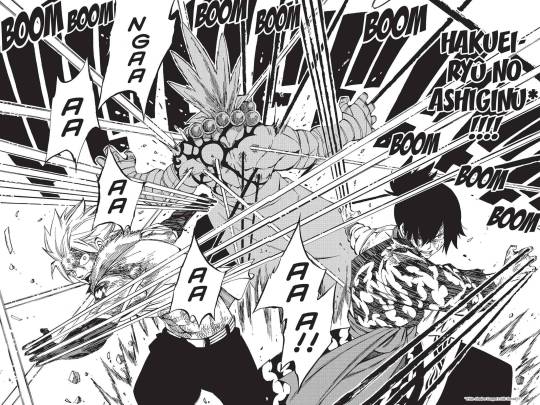
Which solidifies the fact that Rogue is no longer intimidated by his shadow because, as he said himself, Sting would be able to kill it in the worst case scenario. He no longer lives haunted by the thoughts of his shadow taking over him because he knows Sting will always be there to protect him.
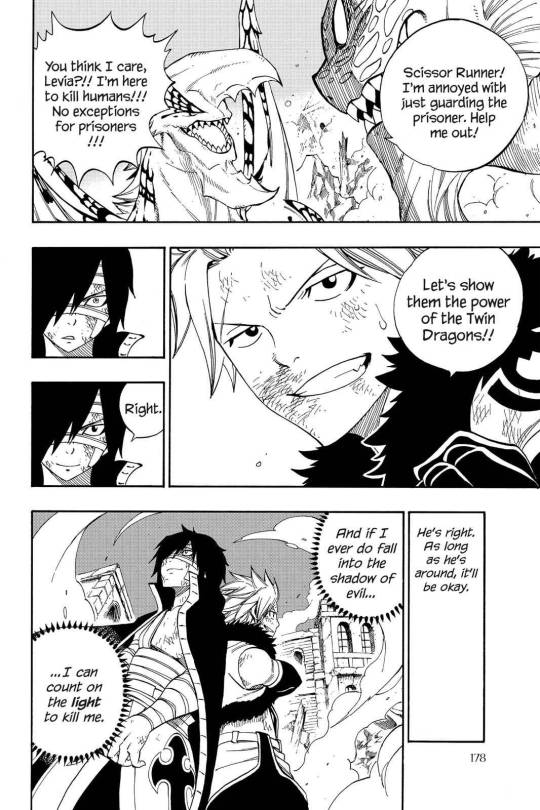
But this obviously all happened in the good future where the world didn't end and now THIS is where the fun begins.
What happened in the "bad future" where f!Rogue is from?
If my memory serves correct f!Rogue later revealed that his plan was to open the gate of Eclipse to let dragons from the past in and rule them to overcome Acnologia, who would soon descend and raise the world into chaos.
Now I don't think he gave an exact date as to when would this be but, Acnologia did indeed appear later during Tartaros so we're going to assume that's when the apocalypse started in the bad timeline.
And let's rewind for a sec to what happened in the good timeline's Tartaros: Sting and Rogue helped Fairy Tail, saved Minerva and killed Jienma, which is a direct consequence of what f!Rogue did during Eclipse.
I explain:
What would have happened after the games ended in this bad timeline? Would Sting have accepted to become Sabertooth's new master? His resolution begins when he gives up before Erza and the rest during the final battle but I don't think he really makes up his mind about it until the dragons are attacking the city and he fights to protect his guild, both he and Rogue do.

It's not until both of them are fighting at the end of the world that they realise what made Fairy Tail the strongest guild.
And even after having technically lost, this battle gave them something f!Rogue probably didn't expect.
It gave them hope.
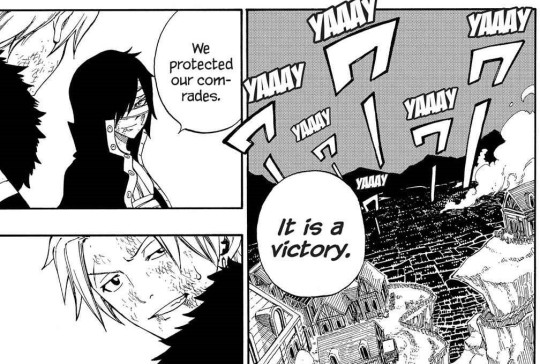
So can we really assume they would've followed the same path had they not fought the dragons during Eclipse? I find it wholly marvelous and poetic how f!Rogue, having lost all sense of compassion, hope and having nothing left but rage, wanting to run amok in this timeline for what happened to his indirectly saved him and his beloved of this timeline from the horrors he had to endure.
Which brings me back to my first statement. In the bad timeline Sting was left with nothing after the games ended, sure Jienma was gone, he got Lector back and he had Rogue but what was he supposed to do from there on? Without the cataclysm of the Eclipse gate opening I assume he'd want nothing to do with Sabertooth again, or maybe he did, but then as Tartaros arrived maybe the guild had not yet gone through the experience of truly fighting along your peers to protect them, none of the guilds had. (Except, y'know, Fairy Tail, but they're the main characters here.)
We can't forget that they were fighting literal demons here, plus Acnologia himself. -Again taking in mind the experience of fighting the dragons during Eclipse had also not happened here.-
You could also argue that the FACE project the Tartaros gates had planned might've actually worked in this timeline, which would've resulted in over half of the population or more being left without magic to fight, it's understandable the world fell into chaos pretty quickly and a huge number of people died, as we saw in f!Lucy's timeline.
And Sting and Rogue were probably neither mentally nor physically prepared to fight all of this right after the Magic Games, they didn't have time to bond with their guildmates after Jienma died the same way they did in the good timeline, hell I'd even argue Sting was probably in a worse state because he got his emotional and physical strength tested back then and there's no way he'd recover from that in such a short time with only Rogue's (and Lector's) help.
Throughout the manga we see how Sting is the uplifting half of this duo, he's the one who constantly reassures Rogue and the rest of the guild. He's taken his admiration for Natsu and learned from it in that sense, but is bad future Sting like this? Is he able to confidently smile and shine a path to guide the people he loves, is he able to fight for them?
In my head f!Rogue didn’t kill Sting because Sting likely gave up fighting or chose to sacrifice himself. (That being to give Rogue another chance to live or because he knew one of them would die and he knew he wouldn't be able to live without Rogue is up to interpretation :))
And this proves to me that neither can live without the other, when Sting died f!Rogue either lost his mind and gave into grief (not fully, he would after Frosch's death) and took his powers in order to survive or to preserve a small part of Sting with him, which would make this shit even sadder after his shadow fully takes over him and he's no longer conscious of this fact, using his partner's power, the only power able to guide and subdue him to kill without remorse.
f!Rogue said that Frosch was his pillar but I refuse to believe Sting is not a pillar for him as well, he may have fully lost against his shadow after Frosch's death but his relationship with Sting having ended simply with "I killed him and took his powers" I refuse to accept, Rogue lost half his heart when Sting died/was killed and Frosh was the last bit of sanity that remained of him after that, which was ultimately but not the only reason he wasn't strong enough to fight his shadow after their death.
As you can see I have a lot to say about this arc and I would've given anything for it to be explored more but alas I've spent the last 6+ years rewriting the entirety of this manga in my head and I love to dive into the possibilities. Like what could have happened if Sting had lost Rogue in that future? What happened to the rest of the Sabertooth's members? I could be here all day.
But anyways I feel I'm not good enough at expressing my thoughts in written form but I hope it's understandable enough? I'm growing more confident though so hopefully I can puke more nonsense about this two <33
#it is currently#5:20 am#clearly im not lucid enough#apologies for any mistakes i mightve overseen lmao#anyways i have a snail in my head that screams stingue to me all day long#on another note im currently going through artblock rn if you havent noticed#this is my way of coping with it lol#fairy tail#sting eucliffe#rogue cheney#stingue#sting x rogue#long post#cast's analysis
70 notes
·
View notes
Text
FTF: How Powerful Is...?
A prolonged breakdown on a character detailing all their scaling, powers, stats, skill, and abilities to determine exactly how powerful they are.
This Week's Character....
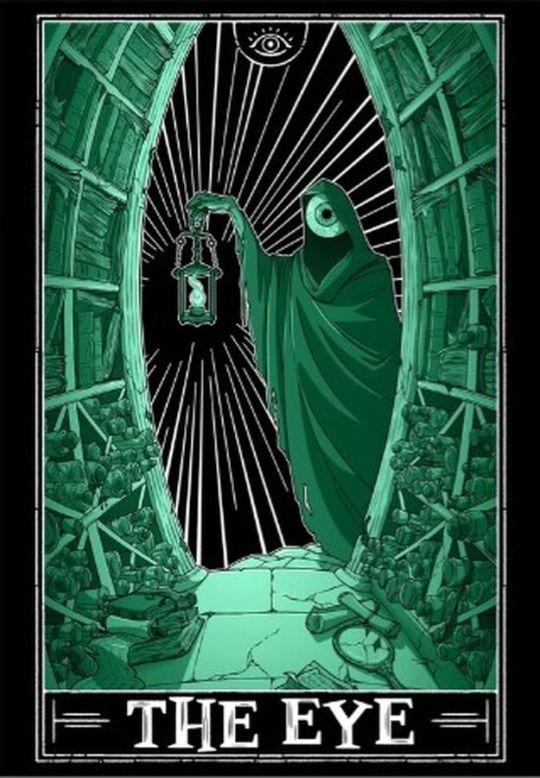
The Archivist!
Conditions:
Season 5 Jon specifically. Due to the exact connection between The Magnus Archives and Magnus Protocol being currently unclear, this analysis will primarily focus on Archives.
Full spoilers for the Magnus Archives ahead.
Jonathan Sims convinced himself he didn't believe in the supernatural when he first started working for the Magnus Institute. He thought all the ghost stories that it cataloged were little more than campfire stories made up by the obsessed and the paranoid. But, little did he know just how deep the rabbit hole he was about to dive down actually was. As such, he was something of a killjoy in his new position as the Head Archivist, often argumentative with clients who went to make statements about their experiences with the supernatural and exasperated by what he assumed to be his predecessor's incompetence.
After he and his entire staff were nearly eaten by a woman made of worms, Jon's mental health rapidly spiral into a fit of paranoia, convinced that any one of his staff could be the next supernatural entity out to get him. This culminated in him getting blown up in an attempt to stop the apocalypse.
To make a long story short, Jon was the perfect pawn to kickstart the apocalypse. His boss, Elias Bouchard, was an Avatar of the Eye, one of the Fourteen Fears that fed off the terror of mankind. Each specific Fear corresponds to a specific phobias felt throughout mankind. The Eye represents the fear of being watched. Of having no privacy whatsoever and being known inside and out for everything that you are. All this time, Elias had been grooming Jon into becoming an Avatar of the Eye, causing him to come back from the grave as the Archivist.
Now, Jon was reliant on feeding off of people's fears to stay alive and keep himself in the Eye's good graces. Every statement he read, every ghost story he absorbed kept him fed, and he was possessed by an endless hunger for more. As the Archivist, Jon has the ability to forcibly compel statements out of people. Forcing them to share whatever information he wants from them, usually forcing them to relive horrific encounters with the supernatural to keep himself alive. There was no ethical way to live as a monster, after all.
Turning Jon into something not quite human was only step one of Elias's master plan. After that, he had to manipulate Jon into having encounters with each of the other Fears. Being "marked" by them as a result of encounters with their Avatars, nearly getting him killed numerous times. All to turn Jon into the perfect candidate to summon all of the Fears into reality at once in one great ritual, ending the world and granting Elias immortality.
As the man who caused the apocalypse, Jonathan was made the most powerful Avatar on Earth. The Fears have merged with and altered reality on the fundamental level, altering reality down to its foundations. Time as we knew it no longer existed, and Earth was split into domains ruled by Avatars of the Fears, who managed humanity like cattle so the Fears may gorge on their suffering forever. If Jon could not find a way to end this nightmare, he would be made to witness the suffering he wrought until the end of human history. When there were no humans left to feed on and the Fears all starved.
Jon's status as an Avatar provides him with several supernatural abilities. He possesses a healing factor, being incapable of cutting off his own finger because the wound heals too fast, and he can sense the location of his own severed body parts, being able to use his own removed rib as a beacon back to where he came from while buried deep within the Buried itself. Now that the Eye has effectively arisen to all powerful, all knowing status, Jon can simply automatically know anything the Eye knows. He can simply ponder any question and have the Eye automatically provide him with the answer.
He's also the most powerful Avatar who ever lived and should casually upscale any feat performed by any other Avatar in the series. This would include Avatars of the Vast, such as Simon Fairchild, being able to create clouds that covered entire mountain ranges or even islands, and Avatars of the Desolation, who could reduce entire forests to ashes just by being born. At one point, numerous Avatars from different Fears, the Fairchild Family, the Lukas Family, and Maxwell Rayner, all combined their energies aboard the Daedalus space station to create an entity so unspeakably huge it blotted out all the stars visible in the sky.
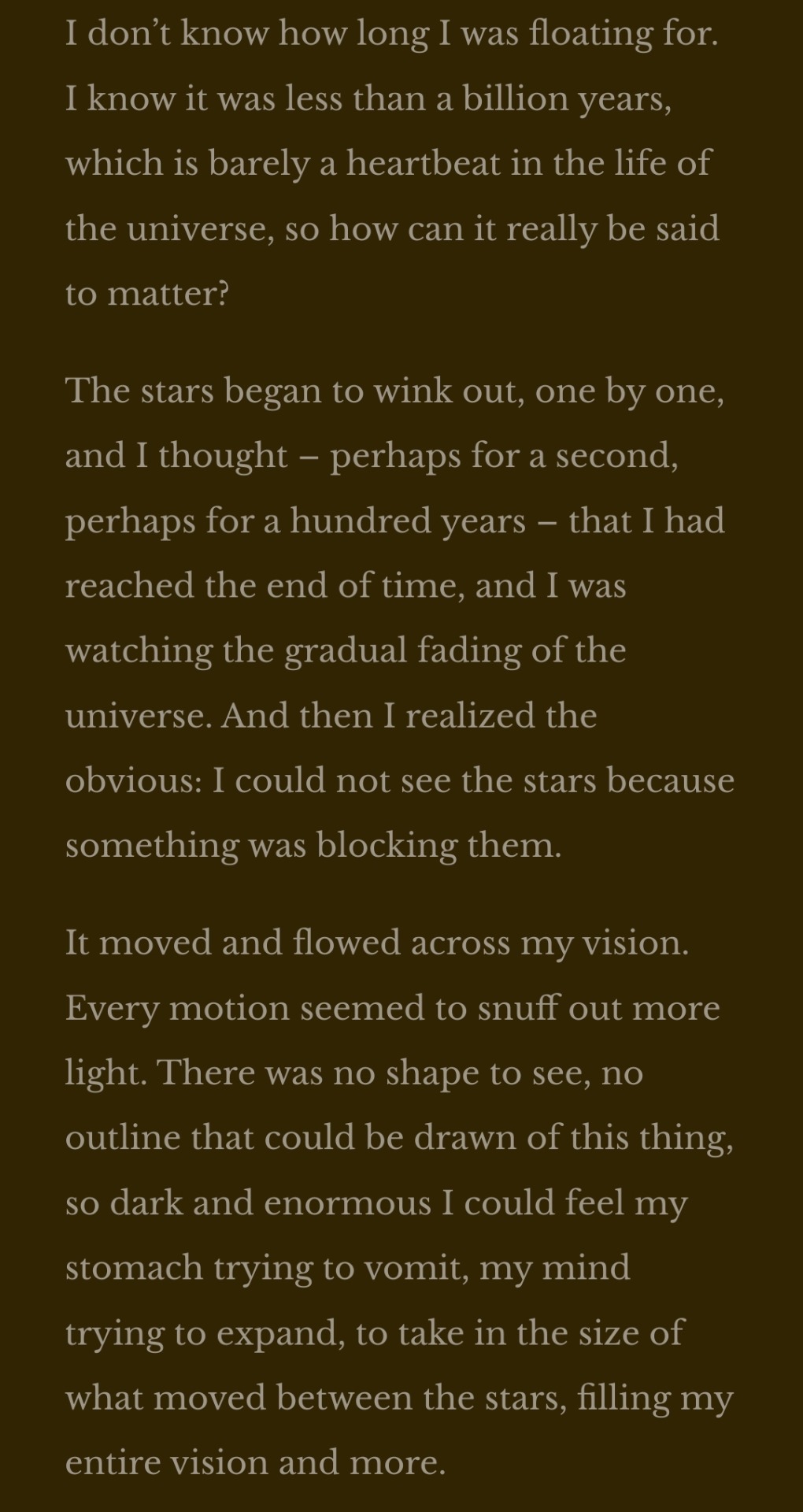
This unfathomable power is consistent. Even before the Eye-pocalypse, Jon was powerful enough to completely erase the Dark Star, an anti-sun that would've replaced the star in the middle of the solar system and caused an entire "universe of purest darkness" to revolve around it, if Maxwell Rayner's attempts to summon the Dark into reality hadn't failed.
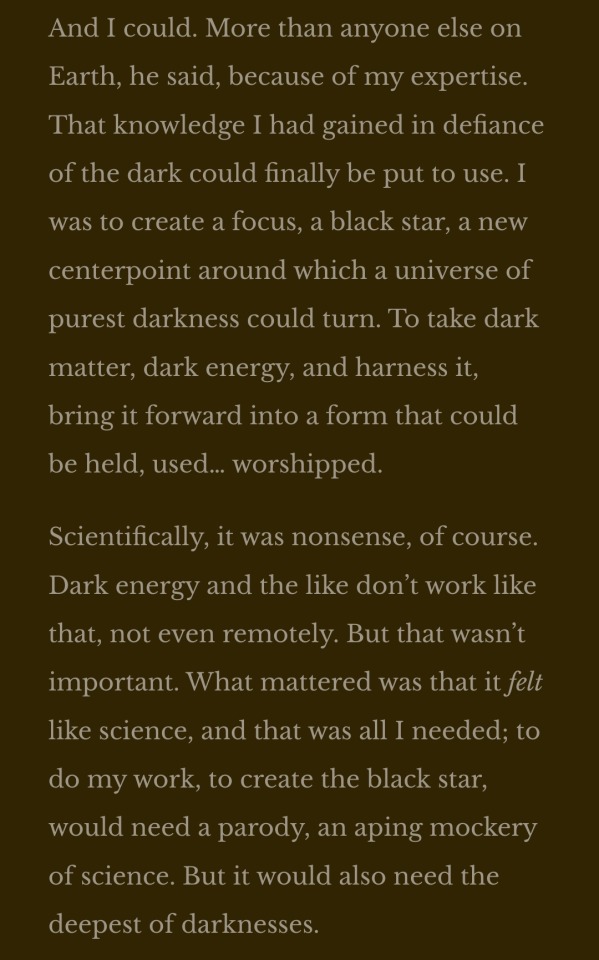
Sometimes artifacts related to certain Fears can even just casually contain realms of infinite size, such as the Coffin containing the endless realm of the Buried "forever deep beneath creation". The same realm of infinite size that Jon was able to escape.

Making this more impressive, is that the Buried is so huge that other Fears cannot reach their Avatars once their Avatars are trapped inside, rendering them powerless humans once again. Even Jon was cut off from his powers inside it for a time, but he still managed to escape with some outside help. Season 5 Jon should be far more powerful than Jon was at the time and he should absolutely be more powerful than this random artifact.
Jon's most powerful ability, by far, is his ability to extract statements from other people. More than just forcibly compelling people to tell the truth, the ability forces the victim to tell their story coherently, even if they otherwise couldn't or wouldn't, and even allows Jon to somewhat relive the experience himself, whether he's reading the Statement or extracting it in person. Jon needs to extract statements to survive and his abilities get stronger the more "well fed" he is. In the event that the victim survives the process, they are forced to relive the events the shared in their nightmares every time they go to sleep. Those who don't are erased from existence entirely. This can be as a result of attempting to resist the compulsion to share their stories, such as with Peter Lukas, or as a result of Jon "seeing" the target so thoroughly that the Eye eats them completely, leaving nothing behind in a "metaphysical explosion".
The most impressive case of this was when Jon erased the Distortion, an Avatar of the Spiral who is as old as time itself and who lives on an island that does not exist. The Distortion's true form is a realm of endless corridors, a series of infinite hallways that defy the laws of physics, trapping prey forever as the corridors feed on their madness and digest their prey into nothing.
Despite this, Jon was still able to erase them, leaving nothing of this entity behind. Jon erased a sentient domain, an entity that doesn't exist, from existence.
Even then, Jon is able to forcibly transform other people into Avatars, without needing the process of being resurrected by an entity, or just revoke someone's Avatar status completely, depowering them outright.
Eventually, Jon killed Elias in some sweet, sweet payback and took his place as the Pupil of the Eye, causing him to experience the entire history of the Fears, from the start of human history up until the present day, in about twenty minutes. Combine that absurd ability to process information with the fact that time no longer conventionally exists, and Jon's speed and ability to react likely can't be mathematically quantified... period. Textbook immeasurable speed.
Jon is so powerful that his existence alone was anchoring the Fears to reality, even as they begain to be pushed. His presence was singlehandedly preventing them from existing the universe and spreading their being across the entire multiverse, where they would infect possibly thousands of worlds. If not outright infinite worlds.

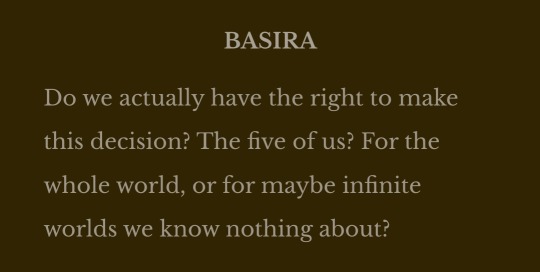

So, Martin, Jon's boyfriend, makes the choice to kill Jon to spare their universe. While Jon's powers and abilities may be operating on a Multiversal and immeasurable scale, Jon himself is still physically a human. Even after he became an Avatar, Jon constantly gets his shit rocked in ordinary fights where he can't use his powers because he's still an ordinary human without them.
Jon and Martin disappear with the Fears, their fates unknown as their universe is freed from the Fears rule. It's possible they and the Fears simply stopped existing with nowhere else to go and no other universes to infest. Or its possible countless realities are now doomed and Jon and Martin are still out there together. We may never know. Given the curse knowledge brought upon Jon, maybe that's for the best.
In total, Jon at his peak should scale to at least Universal, being far superior to the Daedalus ritual, the Black Star, the Buried within the Coffin, and countless other cosmic scale feats, possibly reaching as high as Multiversal to Multiversal+ depending on the scope of the Magnus Multiverse, with speed showings consistent with Immeasurable due to time no longer existing. This is balanced out by him being a relative one trick pony and a glass canon, still being just an ordinary human without his powers, and his abilities can be removed if he's ever brought to a realm outside the Eye's influence.
7 notes
·
View notes
Text
Honest Hearts: A Rough Rewrite
Hey! I’ve been working on an Honest Hearts rewrite-type-thing for a bit and figured I’d solicit feedback/assemble a post to store some of these ideas.
A detailed explanation of the premise is under the cut, but I’ve made this as a more interesting reintroduction to major locations, along with the characters who live there. I also have some lore consisting of letters, scripture, and holotapes that’s still in the early stages, along with a complete companion wheel for Salt-Upon-Wounds (he’ll follow you around for a little if you decide to help him out). Endings are now finished as well. I’m not planning on expanding this into a full mod, but I’m assembling everything in Twine so I can utilize branching dialogue and mimic skill checks.
I want to keep adding to and editing this because I’m having fun with it, so if you have any input, let me know!
Essentially, the story proceeds as written up until the point where Daniel sends you to either kill the White Legs or destroy their war totems. You quickly realize that their camp is deserted, at which point Salt-Upon-Wounds ambushes you, convo-locks you, and tells you that there’s an entirely different side to things here that you might not have considered.
Factions
The Mormons have established a theocracy in the Utah called Deseret, with New Jerusalem - what was once Salt Lake City - as its capital. Large numbers of them survived the initial apocalypse due to their pre-War focus on strong community ties and disaster prepping; over time, they have returned to the model of self-sufficient agrarianism that characterized the historical Mormon state of Deseret that existed in Utah in the 1800s. Their President, who wields supreme executive power, is also their Prophet. The Mormons believe he communes directly with God, but there’s some discontent in New Jerusalem over his hands-off approach to foreign policy and unwillingness to assemble a standing army. The Elders of the Priesthood are pushing him to allow for some kind of formal military to oppose what they see as revived versions of their ancestral enemies: America, Rome, and the “Lamanites” (this is what Mormons call Indigenous Americans; the “Lamanite” idea has historically been used as a justification for racism, and I’m reflecting that here because it’d be kind of heinous not to). In more than a few respects, Deseret serves as a mirror to the Legion and an exploration of the other side of the coin re: the tactics utilized by colonial empires to present themselves as legitimate while still claiming territory and steamrolling the opposition.
The White Legs are now more explicitly Shoshone, and I’m relying most heavily on the Timpanagos Band for names and historical inspiration (apparently the question of whether they’re Ute or Shoshone is pretty controversial, but I’m sticking with what the Timpanagos have said about it until someone corrects me). After migrating south in the wake of the Great War, the White Legs eventually settled in Ogden, about a day north of New Jerusalem. Initial interactions with the Mormons were friendly, but as New Jerusalem grew and its need for farmland and resources increased, tensions rose before culminating in open violence in around ‘76 or ‘77. Deseret’s party line is that the White Legs conducted a “raid” on one of their settlements and had to be driven away from Ogden; the White Legs claim the violence was not a raid, but a revenge killing after a Mormon killed a young man and was found not guilty by Mormon legal authorities (this is a theocracy, so “legal authorities” here can be understood as indistinct from “the church”). The Mormons established a new settlement on the ruins of Ogden, which they called New Canaan, and the White Legs fled to Salt Lake, where they have been dwindling in number ever since. Salt-Upon-Wounds’ plan to seek entry to the Legion is a last-ditch attempt to save his people from eradication when their neighbors and the land itself seems intent on killing them (not that that makes all the war crimes ok, which is a sentiment you’ll be able to express to his face if you engage him in conversation).
The Dead Horses are a pastoral society from out of Dead Horse Point, and are split almost down the middle along political lines. The more conservative, religious side opposes intervention in Zion. Graham desecrates the corpses of his enemies as an intimidation tactic, and because the Dead Horses’ religion is so eschatological and heavily focused on properly cleaning, preparing, and interring the dead, a big chunk of the religious leadership opposes him on that basis - they think his tactics are ungodly. They’re also worried that any Dead Horses who die in Zion and are interred there will be severed from their connection to Dead Horse Point and doomed to a separate, lonely afterlife. The younger, more progressive elements of the tribe are less traditionalist, sometimes less religious, and overall not as concerned about Graham’s treatment of the dead because of the potential benefit they might be able to derive from him. Follows-Chalk is their de facto leader, and while the Dead Horses don’t formally allocate political power, he’s among the most influential people in the informal tribal leadership. Most of the Dead Horses who’ve come to Zion have done so either because they support Follows-Chalk politically, or for practical reasons - namely, Graham’s access to a dizzying number of guns and his willingness to give them to anyone who’ll fight for him.
The Sorrows are now a terrace-farming agrarian society instead of hunter-gatherers (Zion has a lot of agricultural potential, and there’s already a few farming plots in the Sorrows camp you see in-game, so it’s not a huge departure from the canon). I’m keeping their Mexican heritage, but I’d like to give them some Ainu influences as well - partially for selfish reasons, but also because bears are extremely important to our culture and theology, which gels well with the elements of Sorrows culture and religion that appear in the canon. I’d like to keep the Survivalist because I like him, but I want to expand on their faith. One of the ways I’m doing that is by deciding they can still read English, even though they no longer speak it; it’s basically their equivalent of liturgical Latin. They’re also rigidly matriarchal and in contrast to the Dead Horses (who eschew formal political hierarchies) or the White Legs (who elect a chief who serves until he dies, is deposed, or voluntarily abdicates), leadership positions are allocated through matrilineal primogeniture; Waking Cloud inherited her position from her mother. Religious leadership, likewise, is only available to women. You’ll be able to talk to Waking Cloud about some of the ways this framework is incompatible with the Mormon perspective, and can appeal to her desire to retain power.
Characters
Canon Characters
Joshua Graham and Daniel are largely unaltered except through the addition of lore that gives insight into their cultures, motives, and pasts.
All three tribal leaders (Follows-Chalk, Waking Cloud, and Salt-Upon-Wounds) are either given new backstories, a different set of motives, or different approaches to one another/Graham and Daniel. They’re also explicitly leaders now - what power Graham and Daniel have, they derive from whichever tribal leader they’ve managed to attach themselves to. Of those three, I’m altering Waking Cloud the least and Salt-Upon-Wounds the most. Like I mentioned, I have a companion wheel for him so far and the bones of two other conversations - one, where you meet him for the first time, and the second, where you speak to him before the final battle. Will link as I finish them.
Original Characters
Each tribal leader now has a rival or right hand within their tribe so I can reflect the different ways the values of a specific community can express themselves.
Follows-Chalk’s primary rival among the Dead Horses is a man who refuses to tell you his name. That’s because using someone’s name in casual conversation is considered unspeakably rude, and the fact that Follows-Chalk is willing to share his own with you is, to Mysteriously Named Old Man Character, yet another sign of how disrespectful and laissez-faire Follows-Chalk is about their shared traditions. Old Man Character is suspicious of you initially, but if you speak to him more he starts to warm to you. The goal is to give you a sense that this he’s pretty xenophobic but for good reasons, and despite his political conflicts with Follows-Chalk, has a lot of love for him. He just wants what’s best for his family, and Follows-Chalk is part of that, even if Mysteriously Named Old Man Character thinks he’s making the wrong choices.
Kiiki is Salt-Upon-Wounds’ right-hand woman and intended as a contrast re: the approach to war and its costs. Salt-Upon-Wounds has done some horrible things and gets a fair bit of dialogue about that, but Kiiki is willing to go even further than he has with very little prompting. Her chief copes with what he’s done by trying to assure himself that the ends of war are worth the cost; Kiiki deals with it by trying to convince herself that the means weren't so bad, actually, and that anyone who isn’t nailing corpses to walls is being naive. All of that makes her sound pretty shitty, but she’s nowhere near as devoted to the idea of a Legion alliance as Salt-Upon-Wounds is. It only takes one very low Speech check to convince her that going Legion is a bad move, and one of the paths involves assassinating Salt-Upon-Wounds and installing her as the new leader as a way to stop the White Legs from joining Caesar. I haven’t added this path to the ending Twine because I’d like to finish Kiiki’s dialogues before I do that.
I’m replacing White Bird as the Sorrow’s spiritual leader with a woman named Imekanu. She’s incredibly old, savvy, and knowledgeable - she’s never been outside Zion, but has a store of books in English, Spanish, and Japanese that have allowed her some insight into what caused the war, if not the current state of the world. She’s also aware of the Survivalist’s origins - not because she’s entered any of his hideouts, but because she’s read over the scriptures and has correctly identified them as letters. Her perspective is that the Father in the Caves was a human being, but that doesn’t diminish his religious value. She sees him as analogous to the Buddha or a Catholic saint: human, sure, but still with access to some deeper truths about the purpose of man and the nature of human goodness. You’ll discover that this idea (that the Survivalist was a holy man rather than a literal god) is the most common perspective among the Sorrows, and you can talk to her about how this departs from Daniel’s perspective that the archetypal Father is divine, not human.
Quests
Each tribe has a specific quest that will either lower or bypass some of the penultimate checks that will determine your ending (people are more likely to believe what you’re telling them if you’ve already won their trust).
The Dead Horses: Joshua Graham has been putting the heads of the fallen up on pikes across Zion. The Dead Horses’ religion is deeply concerned with proper treatment of the deceased, and Graham’s decision to desecrate the corpses of his enemies goes against virtually everything they believe. The old man who won’t tell you his name asks you to take the heads off of the pikes and bury them deep in Zion, and to bring Follows-Chalk with you so you’ll have someone to tell you how to treat them properly. Over the course of the quest, Follows-Chalk will share some of his own beliefs about death, and you’ll have the opportunity to share your own. If you complete this quest without sabotaging it, Follows-Chalk will be willing to betray Graham to the White Legs before the final battle.
The Sorrows: This is basically just Ghost of She, but after defeating the Yao Guai you’ll discover a holotape revealing that the girl wasn’t killed by the bear, but by one of the murderers from Vault 22. Waking Cloud will speculate that maybe the Yao Guai wasn’t the ghost of the little girl at all but some other force that wanted to push you to discover the truth. If you wait until the end to tell Waking Cloud about the death of her husband, you’ll have to pass a Speech check of 75 to convince her you’re telling her the truth; completing this quest drops the check to 50.
The White Legs: Salt-Upon-Wounds will ask you to help him sabotage the Mormons’ preparations for the battle. If you help him with this, it’ll drop the Speech check for you to convince him to leave from 100 to 80. It’s not necessary at all to get the tribal confederacy ending, but a new note will appear in your inventory if you finish it and meet a couple other requirements (asking him certain questions, not attempting that one Speech check about religion, etc).
Endings
I’m trying to incorporate as much variety as possible, but there are three main ending paths: siding with the White Legs, siding with the other two tribes, and peace. The basic idea is that the outcome is predicated less on your direct intervention, and more on how other people act based on the facts they have available to them. Most of your influence is through your choices to hide or reveal key pieces of information, and the skill checks you need to access certain endings are less you convincing a character to do something and more convincing a character to believe you’re telling them the truth. There’s one major exception to this, it requires maxed Speech, and the ending it gives you is markedly bittersweet because you’re trying to get a guy to act against his own best interest. I’m writing all the endings up here, and will probably edit them as things change. The post where I explain them in more depth can be found here.
And that’s the story so far! Thank you for reading, and again: if there’s anything here you think is poorly-conceived, let me know. Thank you to @baelpenrose, who’s a grad student in the history of the American West, for helping me workshop a lot of this stuff. If you’ve got expert knowledge on any of the concepts I touch on or are personally a member of any of the groups I’m describing, please feel free to hmu: anon is on, and you’re always welcome to DM me. I’m just doing this for fun, but I still want it to be as not-shit as possible.
#fallout new vegas#fnv#honest hearts#honest hearts rewrite#probably should have started with initial conversations but oh well lmao
63 notes
·
View notes
Text
The 100 6x13 "The Blood of Sanctum" Review
Well, The 100 fans, how are we feeling? Tonight we watched the last season finale The 100 is ever going to give us (the next will be a SERIES finale) and I must say, this is perhaps the first time a finale from this show has left me unsatisfied. Let’s delve into why that is:
Closing Season 6 was always going to be a bit of a challenge. We entered this season with perhaps one strong “A” plot and a minor subplot. We walked out with approximately five more plot lines and none of them are ones I’d consider minor. It’s astonishing to me that The 100 managed to craft a finale that not only didn’t close a single one of it’s existing plot lines adequately but also opened up, quite literally, an entirely new can of worms (anyone remember when worms where a thing on this show?). Let’s run through the list shall we:
Worm Number One: Have You Seen This Boy?
We start the season with the mystery of the Primes, and although we now know exactly what they are and the vast majority of them have been floated, we are left with Russell the Eighth and Priya’s mind drive, clutched securely in the grasp of a now brainwashed Jordan. If it wasn’t obvious enough that Jordan is “under the influence” so to speak, we watch the camera focus on his adjuster while he chats with Bellamy in the finale, proclaiming that he is fine even as he spouts out pieces of information that would make me question that if I were in Bellamy’s shoes. The Prime plot, which could have ended this season, will now make its way into Season 7, where the cult that we were introduced to in this final episode will have a more active role in disrupting the peace. I wouldn’t be surprised if a large part of Jordan’s role next season is finding a new host for Priya and I can’t bring it in me to be upset about that.
In a season where Jordan Jasper Green was one of the most anticipated new additions to the cast he was sorely under-utilized. We listened to various characters recite Monty’s charge to do better all season, but they all failed Monty and Harper where it mattered the most: their son. Shannon Kook is an expert at bringing a Harper-esque zest for life mixed with Monty’s desire to live better and it was a promising combination and one that was lost after episode 5 of this season. While I understand the appeal of first love, especially when you’ve never met anyone who wasn’t related to you or one of your parent’s friends, it is frustrating to me that so much of Jordan’s why is trapped in Priya nee Delilah. It would have been far more interesting to see Jordan take up the mantle Monty and Harper left behind and become the new moral compass of the group, even barring that, I would have been more interested in watching this man-child explore a world that was bigger than the space of the Eligius ship. Opportunity was squandered there and we’ll never get a return on the investment we made.
Worm Number Two: Prime Schmimes
Along with Jordan holding on to Priya’s mind drive comes the need for another host and I have an idea of where he might find one. As I’ve mentioned in my YouTube videos and Twitter threads, they don’t make people Nightbloods for no reason. You need look no further than the Griffin ladies to see that: Clarke, Madi and Abby were all made Nightbloods (born or created) to further storylines and Echo (Ash) will be no different. Although she was spared the privilege of hosting Simone, she is currently the only available Nightblood we know of. Russell is also aware of her status and in the finale he quite clearly states that he wants revenge. He may not be able to bring his family back, but all it takes is one mole in the works to help him achieve that, and he has at least two (Jordan and the adjuster — not to mention the possibility of all of the Children of Gabriel who were brainwashed as well). It would also be revenge for Ryker at the very least — his mother’s mind hosted in the body of the woman who murdered him. While Echo does have the neural mesh (she entered the City of Light as well) and has not been exposed to an EMP, we learned in this episode that Russell was careful to examine Abby before he put Simone’s drive in her — to ensure that there was no failsafe. It’s entirely possible that they can shock Echo with an EMP and implant Priya’s drive and further move Russell’s revenge plot along. After all it was love that drove Gabriel to create immortality, what will love drive Jordan to do?
Worm Number Three: Skynet? Is That You?
Some foreign line of code has managed to find a home in the Eligius ship’s hard drive. While trying to save Madi (and we’ll discuss that in a bit), they essentially crash the Flame, allowing them to remove it without the need for the passcode. While this is happening, Madi and the Dark Commander are fighting a bitter battle for control of her body. I believe that — if one isn’t paying enough attention — it’s easy to say that the reason the Dark Commander disappeared from Madi’s body is because they removed the Flame, but I’m going to hazard a guess that he — like any other virus — realized his removal was imminent and adapted to the situation, leaving Madi’s brain and uploading himself into the Eligius computers.
What does that mean for Season 7 and how will we see him return? Yana Grebenyuk (@yanawrites on Twitter — make sure to watch this space for her finale write up!) postulates that we might actually see him in two places next season! As a rub to Diyoza, who laughed at Gaia teaching Madi how to control the Flame (anyone remember what Gaia says during this scene: “A mind can’t be in two places at once”) Yana speculated that she might actually be trapped with him in the, wait for it, past! We know that the anomaly deals with time and space and we know that when Octavia went in she was gone for some time. Now it seems we have an estimate on how long. Hope is at least 20 years old when she stumbles into the tent and she and Octavia clearly know each other well. As Hope embraces Octavia, stabbing her — much as Clarke did with Finn — she tells her “He still has her” when Octavia asks about Diyoza. Hope’s appearance is very much Grounder-chic and it would also tie into why we learned about Indra seeing the Dark Commander once when she was young.
Further, with his consciousness now uploaded onto the Eligius ship there’s no limit to what the Dark Commander might be able to get up to now. Maybe this is the true beginning of Terminator’s Skynet. With all of that being said: it is rather disappointing that, even with the close of “Book One” a part of the series’ final struggle will still boil down to the Grounders. It’s been 131 years, two nuclear apocalypses, a new planet and a new cult system (the Primes) and we still can’t seem to shake them. It feels like the show should have been called “Grounders” instead of “The 100” for the amount of focus given to them and it’s disheartening. At least for me.
Worm Number Four: The Little Whipping Girl
Clarke, my poor girl. Bradbury may be Bellamy’s middle name, but hers is definitely suffering. This season we’ve watched Clarke be isolated both physically and emotionally from the people she’d once called friends. We watch her put herself out there and have a bit of fun, only to wind up almost kidnapped and taken to the Children of Gabriel. We watch her die, fight viciously inside of her own mind to survive, almost die again, be revived by Bellamy and then realize that while she was dealing with that struggle, her child was losing her own mental battle, and then we watch her lose her mother.
No one person should have to be strong enough to deal with all of that loss and yet Clarke manages it effortlessly every season. We know (thanks to Executive Producer Jason Rothenberg’s Hypable interview with Selina Wilken) that Clarke will be dealing with the grief of losing her mother as Season 7 begins. While I am grateful that she is being given the opportunity to do so, because grief is something that is so often rushed through on this show, I am also concerned about how this will affect Clarke’s issues with isolation. For six seasons now, Clarke has consistently been on the outside of the group looking in, due in large part to her status as lead, forcing her to be the character we follow around to each new location and each new group. Although Jason notes that Clarke will be perhaps even more protective of her family with her recent loss, I don’t necessarily know if the show has the chops to make that work.
It doesn’t help that her best friend (script confirmed) Bellamy now has his own issues to deal with, which leads me directly into...Worm Number Five.
Worm Number Five: We Call That….Regression?
Many of you reading this initially found me via Tumblr or Twitter or YouTube, all places where a huge part of my online persona is my love for and defense of one Bellamy Blake. He has been my favorite character from the moment he appeared on the screen in the pilot episode and I have been in his corner ever since. We’ve watched him, over the course of six seasons, mature, moving past the unhealthy relationship he’s had with Octavia since her birth resulted in both siblings carrying a weight they were too young for, growing into a man who left behind the self loathing and resentment of the past and stepped into the self love. If you’d’ve asked me yesterday what my favorite arc on The 100 is, I would have replied without hesitation “Bellamy’s character arc!”
I’m no longer sure I can do that. After the events of last season, which culminated in Octavia putting Bellamy in the pit alongside Gaia and Indra and forcing them to fight to their possible deaths, burning the farm Monty cultivated and then forcing her people into battle out of necessity, it seemed as if Bellamy was finally ready to separate from the lifelong co-dependent relationship he shared with Octavia. The Season 6 finale has appeared to effectively erase that growth in one fell swoop. Just a few episodes ago we listened as Bellamy told Octavia she was still his sister, but she could no longer be his responsibility and this episode we watched as Octavia was stabbed and misted right out of Bellamy’s arms and into the anomaly. The season ends with Bellamy calling Octavia’s name as the anomaly recedes once more.
In post-finale interviews (again see Selina’s Hypable link above) Jason is clear that finding Octavia is a huge part of Bellamy’s drive in Season 7 (going so far as to compare it to Bellamy’s desire to save Clarke in Season 6), and while I can admire, respect and even understand a brother’s desire to find a lost sibling, it’s a huge walkback (literally almost 360 degrees) on Bellamy’s arc since Season 1. What is the point of watching a show, seeing its characters evolve and grow and change and mature if, in the final season, we watch them revert back to who they were in the pilot episode? Will Clarke always be a girl who’s lost a parent abandoned on a new world? Will Bellamy always be nothing more than his sister’s keeper? Will Octavia always be hidden away somewhere? People aren’t watching television shows to see characters wind up where they began. We watch for the hope that our current situations (whatever those may be) won’t last forever. That growth can be permanent, that who we are now doesn’t have to define who we become, but as we head into Season 7, I’m not entirely convinced The 100 is aware of that.
Worm Number Six: Madi’s Mad as a Hatter...or is She?
Madi’s plot is perhaps the only one that was wrapped up (even as the Dark Commander clearly continues his nefarious deeds elsewhere) but it was done so haphazardly I was left unsatisfied. We have watched Madi deal with the Dark Commander in her head all season, we’ve watched as she’s slowly folded under his control and we watched her break when it’s revealed that Clarke is dead. It does make sense that learning Clarke is alive would bring her back. What doesn’t make sense is how swiftly that’s dealt with. It took the Dark Commander days or weeks (I’m unsure of Season 6’s timeline right now) to successfully set up a home in Madi’s brain and simply seeing Clarke threaten suicide (and also — what a message to send to...lots of people...I understand that Clarke went through a lot this season, but even with the loss of your mother, even with the potential loss of your daughter, you can still fight) was enough to snap his hold on Madi almost immediately.
It’s not realistic. I can understand the need to bring Madi back into the picture, but I think it might have played a bit better if the struggle was more prolonged, perhaps even something they needed to put her back into cryo until next season to discover. Unfortunately the choice was made, and a plot line that bit significantly into others ended with extreme prejudice in about two seconds flat.
Worm Number Seven: Make it Make Sense
(The above image is NOT edited.) The constant will they, won’t they of Bellamy and Clarke’s relationship needs to end now. Even as Jason tells fans that we (as a collective unit) all misunderstood what Bellamy’s drive was in saving Clarke (again see the Hypable interview linked above), he tells EW that "There were a few seasons in the middle of the run where we didn't know, we legitimately were on the bubble and were always trying to engineer something that could possibly be a series ender and a season ender, you know? I have for a while known thematically and like you say, in a general way, what I want the ending to be. I knew what I wanted it to feel like, I knew what I wanted it to say."
When you look back on the middle season finales (which for a seven season run would be Seasons 3-5) Jason has been crafting a very clear endgame, and that endgame is Bellamy and Clarke, together, facing their next adventure.
Season 3 ends with Bellamy and Clarke, in the Polis throne room, standing in front of Lexa's throne. They are united (literally touching), watching their people recover from the effects of ALIE, some wounded (like Jaha), others embracing the people they love (Kabby, Briller, Memori). Clarke delivers the news about the reactors melting down, that they haven't won just yet, and then Octavia kills Pike and walks away. Season 3 ends with Bellamy and Clarke — together — preparing to face their next challenge.
The Season 4 finale is a bit more ambiguous, because Bellamy and Clarke are physically separated but the notes are still there. We come into Clarke making a radio call and she is speaking to Bellamy specifically. She says "I still have hope" — that call back to the "You still have hope?/We still breathing" moment that sent the Bellarke fandom into ecstatic spirals of joy and — as a ship bursts through the atmosphere — Clarke stands, her breathing quickens, she smiles and she says "Never mind, I see you" and "I See You" (Confirmed by Tree Adams to be written for and about Bellarke), plays in the background.
Even as we watch Clarke's joy turn into apprehension when she realizes that's NOT Becca's rocket and instead says prisoner transport — if the series had ended here, in this moment — it's possible that it could have been Bellamy (and the others) walking off of the Eligius ship and in fact, that was the most common theory during the hiatus: that Bellamy and the others had joined up with the Eligius crew to combat the fuel issue, which wasn't far off. The series would have ended on the assumption that it was Bellamy walking off of that ship, reunited with Clarke and together again, facing the challenge of repopulating a barren Earth (after they dug out the bunker of course) and because we didn't have any updates on the Space Squad until Season 5 premiered, we also would have been left without the knowledge that Bellamy and Ash (aka Echo) were a thing.
Season 5 ends with Bellamy pulling Clarke into his side, both crying, both leaning on each other (with Jordan in the background) united and about to take on this journey (the discovery of a new planet) — together — again. And yes, I know a lot of people were upset about this ending because Bellamy and Ash/Echo were still a "couple", but again, I want to point you back to Jason saying that he was writing these as series finales and he knew what he wanted those finales to feel like and what he wanted them to say.
The theme of the Season 3-5 finales has always been "Bellamy and Clarke, together, facing the next adventure." and the feeling has always been that Bellamy and Clarke and their relationship to one another are the center of the story, that if the story ends here, Bellamy and Clarke are together. I'd even go so far as to say that the theme of Season 4 and Season 5's finales specifically has been about hope and renewal. The opportunity to do and be better in a "new" place.
And that’s fine and dandy. What’s not fine is when this relationship is deliberately given romantic beats, framing and lines in an effort to draw or retain an audience with no payoff. Again, people are not watching television for the never before seen plot twists. People watch television for the characters. They stay for the characters. Friends is one of the most successful shows of all time on the strength of the relationships it showcased as an example, and the same can be said for many other great shows. It’s when showrunners forget that, believing that the story they are so desperate to tell is more important than the audience who have given them the ability to tell that story, that everyone suffers. One need look no further than the recent endings of Game of Thrones and Veronica Mars for evidence of that.
Make the story clear. Make it plain. Your audience deserves that.
In conclusion, The 100 season finales work better when they are written as series finales. Given the knowledge that he would have one more season to close out the show the way he wants to, Rothenberg leaned too far into the chaos of Episode 12 (“Adjustment Protocol”) and left audiences with a bitter, unfinished taste in their mouths. With only 16 episodes left to satisfactorily wrap up all of the arcs he opened or left open this season, I’m not convinced we won’t be seeing a repeat of Game of Thrones.
April’s episode rating: 🐝.5
P.S. A Good Worm:
If you’re like me and you need something to look forward to as we enter the long hiatus before the final season of The 100, think about making your way to Conageddon! Located in Boston, Massachusetts, and this year held on April 3rd-5th, it is The 100’s only American convention and as someone who’s been before (and will be back) it’s a weekend packed with fun and friends. Tickets haven’t gone on sale just yet, but make sure you watch this space for more information, including cast information and ticket pricing!
5 notes
·
View notes
Text
The Ongoing Narrative Evolution of Attack on Titan
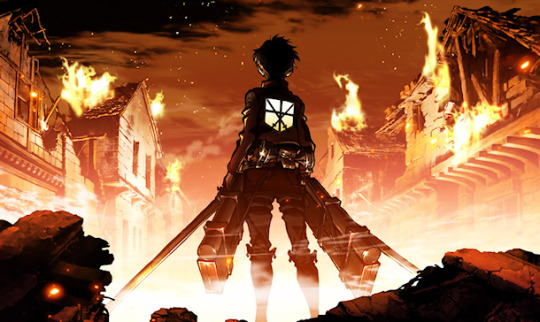
Hajime Isayama’s Attack on Titan (or Shingeki no Kyojin, if you’d like) is, at first blush, little more than a particularly smart and stylish take on the usual apocalyptic-horror formula: existentially-terrifying monsters in a world already lost, with a heap of unanswered questions. This conceit is ubiquitous these days; it’s at the core of hundreds of zombie and zombie-like apocalypse narratives scattered across a dozen different mediums.
How did world get into this mess? How does one survive in a world like this? Is it possible for society to survive in a situation like this? These questions form the backbone of fiction like Attack on Titan— internally within the narrative itself and externally in how the audience engages with it. One of the fundamental weaknesses of most zombie-like narratives is an inability to move past this core conceit and answer any of the questions. Few even try— as to do so might undermine much of the fundamental appeal of the narrative: the life-of-death tension and unknowable nature of the mystery.
Attempting to evolve the narrative past the status quo (no matter how unstable that status quo may logically be) runs the risk of alienating an audience who became engaged with the work because of that status quo in the first place. Oftentimes, the questions raised are far more interesting than the answers, and authors sometimes have no actual answer in mind when they ask these broad-sweeping questions in the first place. At the same time, maintaining a status quo indefinitely is boring; it’s at the core of why zombie fiction is so same-y and garbage.
One of the things that’s most remarkable to me about Attack on Titan is how it is not only willing to abandon the initial status quo, but continually evolve and develop the concept of the narrative while not betraying the themes and events it began with. It’s natural in a way that most apocalyptic monster stories aren’t. It continually raises more nuanced, challenging questions while answering older ones, and each new status quos raised is as perilous as the one that preceded it— just more complicated and nuanced.
Very little of what I’m talking about here is particularly revelatory if you’ve been keeping up with Attack on Titan, and if you haven’t been this discussion is going to amount to little more than the world’s strangest Cliffs Notes. I just want to nail down just how much Attack on Titan has been successfully evolving its themes while staying engaging, largely for my own satisfaction having just recently caught up. Spoilers for Attack on Titan through Chapter 98 after the break.
Much of Attack on Titan’s initial appeal came from its basic aesthetics. The imagery of sword-wielding techno-spider-men fighting giant naked man-eating men is at the core of why the anime was instantaneously popular, and why the manga blew up in the first place. But it’s fascinating how quickly it moved past being just that. In a way, Attack on Titan has undergone a continuous, evolutionary process— resulting in increasingly complex thematic phases that we can point to.
The initial premise was the simplest. The last remnant of humanity lives in a walled city that keeps horrible man-eating giants out. Life sucks. Then the titans breached the walls! The lead character, Eren, becomes an orphaned refugee after a titan eats his mother right in front of him, and enlists in the scout legion to try to get his home back, and get his revenge. But things suddenly turned in just a single volume’s time, when by a titan eats Eren… and inexplicably he transforms into an intelligent, sentient titan who wrestles the bad ones!
The immediate reaction by many to this twist was rather negative— which isn’t that surprising. After all, it seemingly undoes the base premise of the series, and forces another greater suspension of disbelief just after people had come to terms with Attack on Titan’s definition of “reality.” Isayama sold them a bill of goods that promised nasty naked boys eating spidermen; a sudden twist towards what first glance seemed to be rank power fantasy of “I AM THE NAKED GIANT BOY NOW, I SHALL DESTROY THE GRAVEYARD SMASH” was something of a ‘betrayal’ of the darker themes that had brought them in in the first place. But those who gave this course change a chance discovered that rather than the narrative becoming simpler, it was WAY MORE COMPLICATED. Before Eren became a titan, we had no idea what the titans were, or where they came from. After he became a titan, we had even less of an idea, as the evidence we now had was so fragmentary and seemingly contractor as to defy most speculation. The general question of the setting (“How?”) became an outright mystery (“What!?”). What was the connection between humans and titans, and how the hell did Eren manage to turn into one and back again?
This turn also really kicked off what’s been a central aspect of Attack on Titan ever since: politics. The revelation of Eren’s ability was an incredibly political one; what was to be done with him, and what was the motivation of those now wanting him dead? The revelation that there was in fact a deeper connection between titans and humans suddenly brokered a great deal more suspicion in the actions of both the humans and the titans.
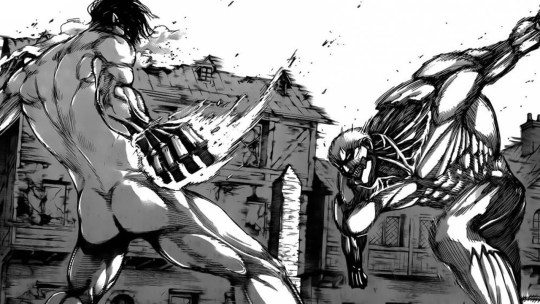
This paid off with the next major twist, when an expedition attempting to make use of Eren’s abilities was attacked by another titan that seemed to be under human control; others had the same ability as Eren! The narrative shifted from being “man vs monsters” to “man vs man, contextually monsters” as the titans took a role less as primary threat and more a backdrop for the conflict. That these “manned titans” seemed to be behind the deliberate compromising of the wall years previously resulted in a massive shift in the overall tone and nature of the mystery. The existential question was now less “Why is the world like this?” and more “Why would someone do this?” and “Who did this?”
The conflict was no longer us vs an inhuman them; who the enemy was no longer as clear. Who could Eren, and us by extension, trust? Those in charge seemed awfully like they knew way more than they let on, and it turned out that several of Eren’s compatriots from his training were the titan-changer sleeper agents, and were those who caused his family and thousands of others to die. But even stranger, these titan-changers in their midst impossibly came from some place outside the walls— which contradicted all we knew about the outside world.
But we had little time to dwell on this, as Eren and the scouting legion… initiated a coup de ’tat!? The government was quite clearly complicit in the state of things, willing to throw away millions of lives to maintain the precarious status quo and keep their hold on power. To do so, they attempted to seize Eren, triggering the coup. This finally moved the conflict to one purely “man vs man”, with the titans becoming little more than raison d'être. The coup ultimately culminated with the crowning of a new, more cooperative monarch, and the revelation that the nation’s isolation and regressive state was foisted upon it by its former rulers. We also began to learn more of the true nature of the titans: that they are created, that the power to become a titan can be transferred, and that it all somehow ties into the overthrown royal bloodline.
It seemed like oh so soon, we would be able to answer the ultimate mystery of the world. Eren gained his titan power thanks to a serum his father had given him right after the first wall collapsed, he seemingly having come from some place outside the walls just like the titan-changers. All the scouting legion needed to do now was take back the wall that had fallen all those years ago, and pull from its ruins the lost secrets of Eren’s father. Unfortunately, the titan-changers too knew of this goal, and it culminated in a pitched battle of titan versus titan and man versus titan, against those who had destroyed the wall.
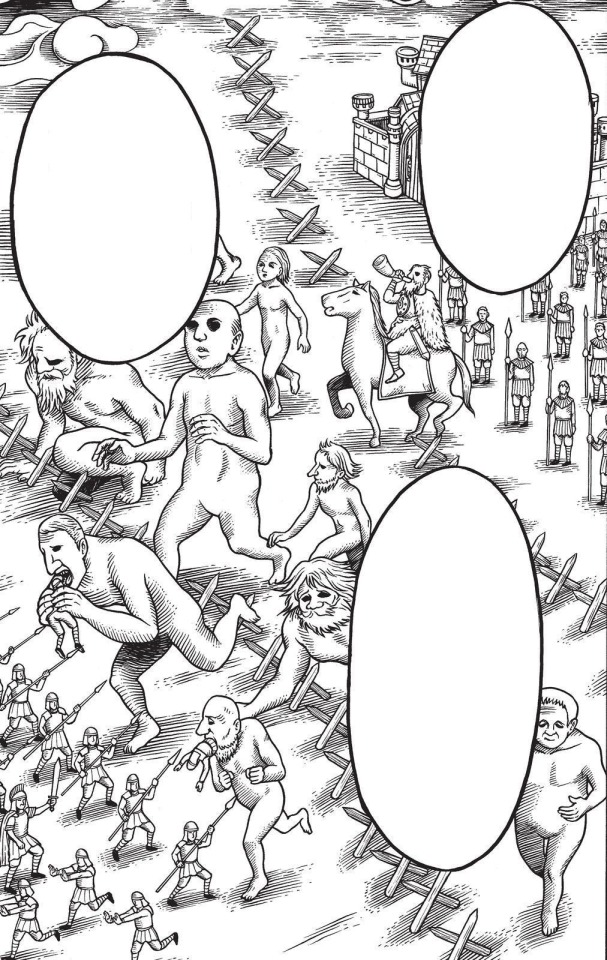
The victory, at tremendous cost, brought the greatest revelations and shifts in the narrative of all: the conflict had always been one of man vs man. The walled nation that they thought was the last bastion of humanity? Little more than a single isolated kingdom, whose citizenry was of a seemingly cursed bloodline with the ability to transform into mindless titans— as well as to inherit the ability to become an intelligent titan. The titans hadn’t destroyed the rest of the world; they were amid an industrial revolution! The titans on the island were little more than dissidents from a beleaguered ethnic minority, transformed into monsters and released there as a last cruel insult to a nation that once ruled the world.
And now we truly see that nation at large. Those once oppressed by the titans now use them as weapons in World War I-era armed conflict, turning non-citizens kept in ghettoes into living weapons in an exploitative military machine. It’s far beyond the simple cruelty of man fighting monsters; true horror always belongs to the cruelty of mankind alone. Eren and his homeland don’t need to kill all the titans, or even defeat some narrowly-defined enemy; the world is their enemy. By their very birth, they are hated, used, and discarded. And how do you fight that? You can’t spiderman that away.
It seems their answer is to repay it in kind. Eren has infiltrated the home of those titan-changers who had once infiltrated his own. To what end? We don’t know yet. But I’m really fascinated to find out; it’s a total inversion of the concept we started with, and it took a hell of a ride to get here and have it feel like a natural extension.
19 notes
·
View notes
Photo
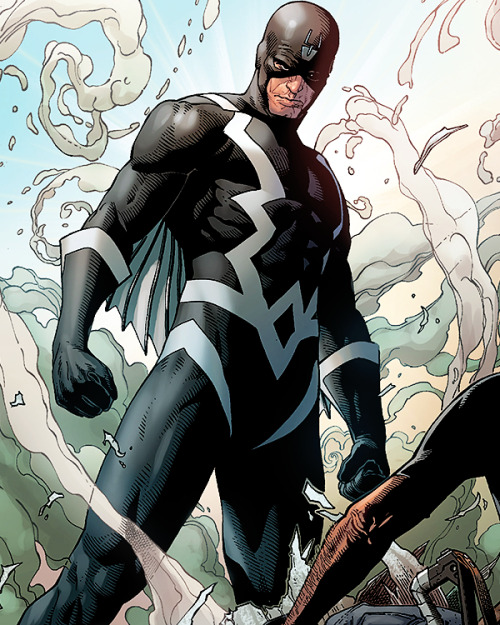
Inhuman of The Day
February 1st - Black Bolt
Blackgarr Boltagon, the eldest son of the former King and Queen of the Inhumans, Lord Agon and his wife, Queen Rynda. Blackgarr (or Black Bolt as he is later called) was exposed to the Terrigen Mists when he was still in his mother’s womb. As a result, he was born already possessing incredible powers. Along with enhanced strength, flight, and the ability to destabilize molecules, his powers additionally include a tremendous electron blast localized in his vocal cords.

The infant Black Bolt’s initial cry released a devastating sonic boom that nearly destroyed the birthing center. Due to the volatile and potentially destructive nature of Black Bolt’s sonic powers, he was placed in a sound-nullifying chamber and he spent much of his youth sequestered in isolation. During his adolescence, Black Bolt’s young cousin, Medusa, would frequently visit him. Though he was unable to talk with her, Medusa gradually learned to communicate with her cousin through gestures, intuition, and body language. Over the course of her many visits, the two fell in love.
Black Bolt trained with Inhuman monks so to gain greater mastery over his sonic powers. Through extreme discipline, Black Bolt learned to never unintentionally utter a sound, not even while asleep. Once this mastery was attained, Black Bolt was finally allowed release from confinement and entry into Attilan society.

Despite the hardships that Black Bolt had endured throughout his youth, his younger brother, Maximus, had grown terribly envious of him. As the elder son of Agon, Black Bolt was first in line of succession for the crown. Supremely cunning and ambitious, Maximus coveted the crown for himself and for this he hated his older brother.
As part of a scheme to win the throne, Maximus entered into a pack with a group of Kree assassins disguised as emissaries. Black Bolt discovered this plot and attempted to stop the assassins with his sonic powers. He destroyed the fleeing Kree ship but it unfortunately crashed into the royal retreat, killing Black Bolt’s parents. With the death of King Agon, Black Bolt was made the new king and he named Medusa as his fiancé and the voice of the king.
This tale has since been retconed and slightly altered, revealing that the Inhuman now known as ‘The Unspoken’ had temporarily stepped in as a stewardship king following Agon’s death. The Unnamable’s tenure as ruler was meant to be temporary and only last until Black Bolt was ready to take the throne. Nonetheless, The Unspoken decided not to abdicate the crown and instead attempted to rule Attilan as a tyrant. Black Bolt ultimately defeated The Unspoken. The tyrant was banished and all record of his name and acts were struck from the history of Attilan (hence the term of ‘The Unspoken’).

Once Black Bolt finally took the throne, one of his earlier acts as king was to free the Alpha Primates, a slave caste who had served Attilan for generations. Although it was the morally right thing to do, this decree was quite unpopular among the other Inhumans. Freedom proved a difficult concept to comprehend for the Alpha Primitives; after generations of living only to maintain the mechanical inner workings of subterranean Attilan, it was the only life they knew. The Alpha Primitives ultimately decided to continue their maintenance of Attilan, only now as a free people, sustaining an uneasy alliance with the surface dwelling Inhumans.
Along with fending off the constant schemes of his brother, Black Bolt has additionally had numerous adventures outside of Attilan. Such adventures have included battles against threats such as Kang the Conqueror, Ultron 13, Blastaar, Apocalypse, The High Evolutionary, The Sphinx, Graviton, and Maelstrom. Although the Kree still consider The Inhumans to be unholy abominations, Black Bolt nevertheless aided the Kree hero, Captain Mar-Vell, in repelling a Skrull invasion.
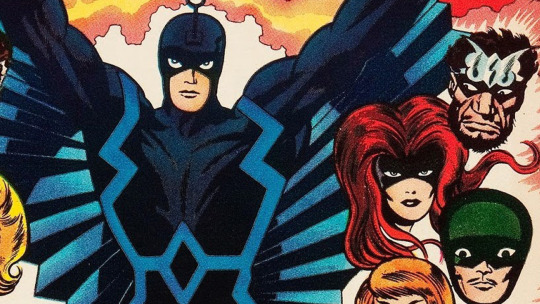
With the assistance of Prince Namor and The Eternals of Olympia, Black Bolt was able to enact a plan to relocate the City of Attilan from the coast of South America to a new location in the remote mountain range of The Himalayas. This act helped to ensure Attilan’s safety from threats posed by the human world and allowed The Inhumans to continue in their desire to remain an isolated people.
With the gradual breakdown of the Earth’s ozone layer and ever increasing levels of air pollution, the planet became inhospitable to The Inhumans. Having lived for generations in the secluded confines of Attilan, the Inhumans had never developed the specific antibodies needed to withstand polluted air. With the help of Reed Richards, Black Bolt relocated Attilan once more, this time to the oxygen-rich Blue Area of The Moon.

Shortly after Attilan’s relocation to the Blue Area of the Moon, Black Bolt and Medusa were official wed. Although this marriage defied the wishes of The Genetic Council, the wedding was a cause for great celebration among the citizens of Attilan. The wedding was briefly disrupted by a battle that was being waged by a Kree warrior and a Super Skrull (two agents of their respective peoples who had been stranded on the moon following The Shi’ar’s trial of Jean Grey). With the help of The Fantastic Four, Black Bolt and the other members of the Royal Family were able to quell this battle and the two combatants were transported back to their home worlds by The Watcher. Attilan enjoyed a newfound era of peace and security in its new home on the moon. And yet, with this peace, the citizens of Attilan no longer felt as reliant on their king to protect them. Black Bolt and his queen remained very popular among the people, but their rule over the governance of Attilan swayed and the Genetic Council came to have more and more power and say over the affairs of The Inhumans.
With this shift in power, The Genetic Council instituted laws mandating a greater adherence to the philosophy of eugenics and the practice of arranged marriages. It was at this time that Medusa announced that she was pregnant with Black Bolt’s child. This revelation quite dismayed the Genetic Council. The council was worried that the destructive potentiality of Black Bolt’s powers, coupled with the history of mental illness in his immediate family (his brother), could result in an offspring that might pose a great threat to the safety of Attilan. The council ordered that Queen Medusa terminate her pregnancy. An anguished Black Bolt struggled with what to do. He very much wanted a child, but also knew the great dangers that his powers entail. It was indeed quite possible that passing down his abilities to a son or daughter could put all of Attilan at substantial risk. Medusa, meanwhile, was outraged by her husband’s apparent refusal to oppose the council. Utilizing Lockjaw’s teleportation abilities Medusa fled Attilan with her handmaid, Mynxi, and hid out in a remote location in the American midwest. Medusa was eventually sought out by her sister, Crystal, along with her cousins, Gorgon, Triton, and Karnak.
Protected by her friends, Medusa gave birth to her child… a son whom she named Ahura. Ahura possessed powers, but not on the scale or magnitude that the council had so feared. They all returned to Attilan and Medusa eventually reconciled with Black Bolt.
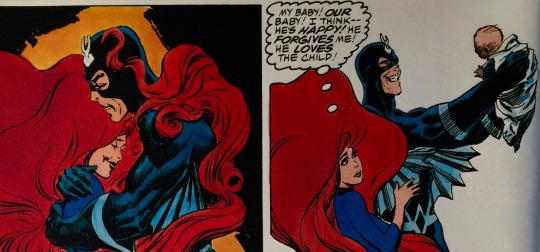
At an undisclosed point in time, Black Bolt had entered into a secret alliance with other leaders of the super powered community. This cabal, known as ‘The Illuminati,’ consisted of Reed Richards of The Fantastic Four, Tony Stark of The Avengers, Prince Namor, ruler of Atlantis, and Dr. Stephan Strange, Earth’s Sorcerer Supreme. One of The Illuminati’s early endeavors was an incursion onto The Skrull Throne-world to dissuade the Skrulls from further hostilities toward the Earth. Unfortunately, Black Bolt and the others were temporarily captured during this mission and Skrull scientists were able to reverse engineer the biological qualities of the heroes’ super-powers – an accomplishment that would much later lead the way to a near-successful invasion of Earth.
Later, the Terrigen Crystals were stolen by Crystal’s ex-husband, Quicksilver, and the majority of these stolen crystals ended up in the hands of the United State’s Government. This led to the Silent War event, which culminated in the US Military detonating a nuclear bomb on the moon, destroying a substantial section of Attilan and killing countless Inhumans. Although the crystals had been recovered, Black Bolt’s failure to protect his people led to his stepping down from the throne and abdicating the crown to his brother, Maximus.

Some time thereafter, Black Bolt was abducted by the Skrulls and replaced with a Super Skrull imposter. This imposter was ultimately discovered and killed by The Illuminati. This occurred at the onset of the Secret Invasion event and the Skrulls attempted to conquer Attilan at the same time they invaded the Earth. Inhuman forces, led by Medusa, fended off the Skrull invasion. Medusa then assembled a strike-force to rescue her husband. She succeeded in this and, once freed, Black Bolt used his powers to decimate the Skull armada. Having found the kingship much more difficult and taxing than he thought it would be, Maximus stepped down and asked Black Bolt to return to the throne.
The devastation of the Skull Empire created a power vacuum in the cosmos, one that was quickly filled by the Shi’Ar and their new leader, the ultra-powerful mutant known as Vulcan. As Vulcan continued his conquest over an ever-expanding empire, The Kree presented themselves to The Inhumans, offering a pack to join forces in an attempt to stave off Vulcan and The Shi’ar. As part of this pack, Black Bolt was named ruler of the Kree people and his cousin, Crystal, was ceremoniously wed to Ronan the Accuser.
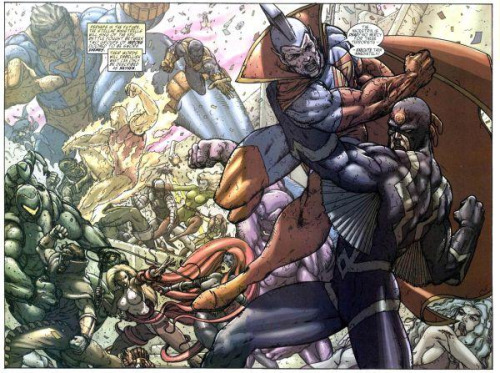
Led by Black Bolt and an elite faction of the Inhuman Royal Guard, the Kree fought a bloody war against Vulcan and The Shi’Ar. It culminated in a massive battle where Black Bolt defeated and destroyed Vulcan yet appareled to have also perished himself. Believing Black Bolt dead, Medusa assumed rulership over The Inhumans as well as the Kree and Attilan was relocated to the new Kree homeward of Kon-Tar.
Shortly thereafter, The Kree Supreme Intelligence managed to reattain lordship over The Kree Empire and The Inhumans fled from Kon-Tar. The Supreme Intelligence (or Supremor) knew of an ancient Kree prophecy that told that the creation of Inhumans would bring about an anomaly that would ultimately tear down the empire and kill Supremor. In order to prevent this prophecy from coming to fruition, Supremor dispatched warships to destroy every planet in which Terrigenic Experimentation had taken place. Only five worlds managed to evade this culling. The Inhumans from these five remaining worlds came together to form the Court of The Universal Inhumans. A newly returned Black Bolt who, as it turns out did not die in his battle with Vulcan, was named the Midnight King and ruler of the Universal Inhumans - with the four queens of the other Inhuman people becoming his ceremonial brides (much to Medusa’s chagrin).
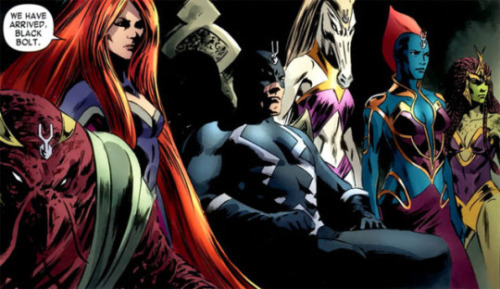
Black Bolt returned Attilan to Earth and there he helped the FF defeat the Council of Alternate Universe Reed Richards, before leading a defense that repelled a Kree invasion of Earth. With The Kree finally defeated, Black Bolt dissolved the Court of The Universal Inhumans. Crystal’s marriage to Ronan was annulled and The Kree were sent away to rule over their own empire, leaving Earth and the other Inhuman planets in peace.
Attilan enjoyed a short time of relative tranquility following the defeat of The Kree. Yet it was not long before a new threat emerged. Thanos the Mad Titan came to discover that he had a son sired by an unnamed Inhuman who was residing among the Inhumans of Earth. It was foretold that Thanos’ son was the one being who could succeed in destroying him and Thanos dispatched his forces to Earth to discover and kill his prodigy.
Black Bolt and his brother, Maximus, understood the extreme level of threat that Thanos posed to not just Attilan, but all of Earth. Together they devised a daring and intricate plan to save their race and their planet. Black Bolt was privy to a great secret, a hidden truth passed down from king to king since the age of Randak. And that being that the citizens of Attilan were not the only Inhumans on Earth. Over the centuries, many Inhumans had left Attilan to create their own colonies all over the planet and the Inhuman genetic loading had become ingrained into a significant portion of the earth’s population. Black Bolt and Maximus came up with a means of triggering the Inhuman gene throughout the population, causing a mass Terrigenesis that would create hundreds of new Inhumans and provide Earth with a new wave of super powered beings to defend mankind against the oncoming threat.

All of Attilan was evacuated. The citizens were sent through the Door of Elldrac and transported to safety. Thanos arrived on Attilan to find it deserted save for Black Bolt. The two battled and when Black Bolt appeared to have been defeated, he released a massive sonic screen that destroyed Attilan and trigger a Terrigebnic Bomb. This bomb released a billowing cloud of Terrigen Mists. (all this is a rather condensed summery of the Infinity Event, made slightly less complicated of the sake of readability).
The Terrigen Cloud crept over the planets surface. It had no effect on regular humans; those human with the Inhuman gene, however, were encased in a cocoon-like shell and emerged transformed into Inhumans. Among those who were transformed by the Terrine Cloud was young Thane, the secret son of Thanos. Terrigenesis bestowed onto Thane tremendous abilities, powers that he ultimately used to defeat his father and put an end to Thanos’ threat to Earth.
Attilan had been destroyed and its remnants fell onto the island of Manhattan, with the majority splashing down into the Hudson Bay. Black Bolt was once again believed dead and Medusa took the throne, overseeing the creation of New Attilan. All NuHumans, those Inhumans who had been created by the Terrine Cloud, were welcome on New Attilan and Medusa was tasked with providing for these new citizens of Attilan while also searching out those were sent to places unknown via the Door of Elldrac. All the while, Medusa was left to believe that her husband and her son, Ahura, had perished in the fall of Attilan.
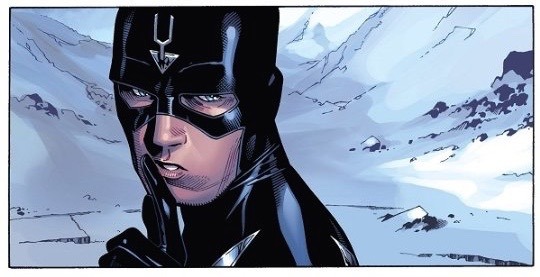
His battle with Thanos, and the massive sonic attack that triggered the Terrigen Bomb had left Black Bolt depleted and weakened. Maximus seized this opportunity to use his telepathic powers to take control of Black Bolt’s will. Black Bolt had previously been able to resist his brother’s psychic abilities, but in this weakened state, he fell under Maximus’ sway. (there’s a bit of a disparity on how these events are told in the pages of ‘Inhuman’ and how it’s told in the pages of New Avengers; and once again this is truncated summery for the purposes of clarity).
Black Bolt was ultimately able to break free of his brother’s control with the assistance of the NuHuman known as Nur. He returned to New Attilan in time to help repel an invasion by the Agents of Ennuix.
Queen Medusa felt great ambivalence over the discovery that her husband was still alive. Though she was happy to see him again, she felt betrayed that he had stayed away so long, leaving her to create and govern New Attilan all on her own. She stated that her husband no longer had a place ruling at her side. Black Bolt could have tried to explain that he had been held prisoner by his brother, but instead chose to simply concede to his wife’s wishes. He bowed down to her as his queen and flew off to places unknown.
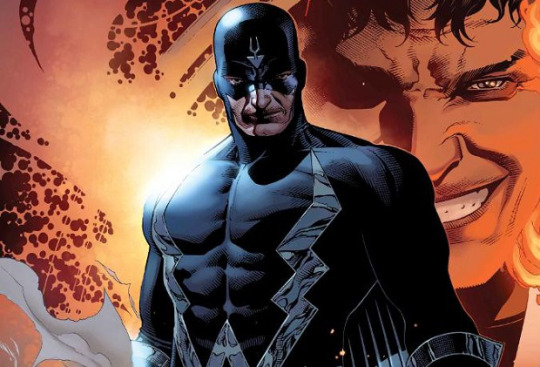
By way of his involvement with The New Avengers Illuminati, Black Bolt was aware of the incursions of alternate realities leading up to the Secret Wars Event. Convinced that his own reality was doomed, Black Bolt entered into a secret pact with Kang The Conquerer whereby he offered Kang his son, Ahura, in exchange for Kang’s taking Ahura into Limbo where he would be safe from the reality incursions. Following the Secret Wars event, where all reality was indeed destroyed and then recreated, Black Bolt set out to take back Ahura from Kang. This proved to be much more difficult than planned and Black Bolt was forced to ask for the assistance of his estranged wife, Medusa, and her new Uncanny Inhumans team.
Black Bolt and The uncanny Inhumans were ultimately able to save Ahura and Ahura utilized his newly enhanced psychic powers to ensure that Kang would no longer threaten the Inhuman peoples.
Although he was able to save his son, Black Bolt has not been able to do the same for his marriage and he and Medusa continue to be estranged from one another. Rather than residing in New Attilan, Black Bolt has new created a new home in the form of a secretive club called ‘The Quiet Room’ situated underneath Grand Central Station in Manhattan.

More recently, Black Bolt was felled by a sneak attack orchastred by Emma Frost and The Dazzler. Taking Black Bolt out was the initial move in a stratum to neutralize the Inhumans so that The X-Men could destroy the Terrigen Cloud and save their species. Black Bolt is currently incarcerated by The X-Men and what will become of him is yet to be seen.
This upcoming spring, Black Bolt is set to star in his own solo series by writer Saladam Ahmed and Christian Ward; he will also be a cast member in the new Inhumans team book, The Royals, by Al Ewing and Jonboy Meyers.
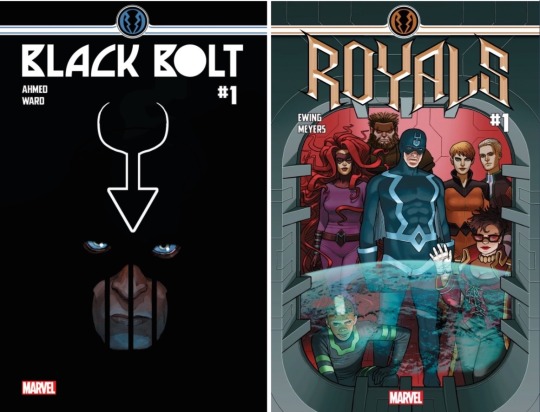
41 notes
·
View notes